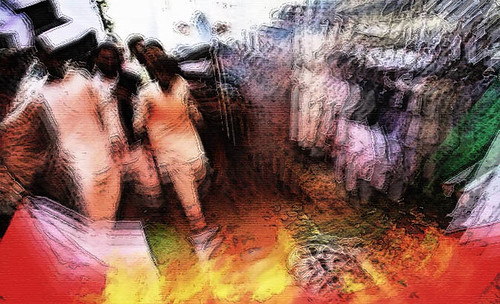Mondoweiss, a progressive Jewish media, Friday published a researched article by Zainab Ramahi, a graduate of UC Berkeley School of Law, comparing the struggle of the people of Kashmir and Palestine.
Zainab Ramahi argues that reviewing the literature on the Indian Armed Forces Special Powers Act (AFSPA), and its origins, it is not hard to draw the connection to Israel's justification of the use of torture and indefinite detention against the Palestinian population by declaring the areas in which it is applied to be in a state of emergency, remaining so for decades.
Kashmiris and Palestinians are sharing the same struggle which is the struggle for self determination against colonial occupation, Rahami says, adding Israel is an oft-cited example of an ethno-nationalist political configuration "rooted in colonial narratives that dictate a racial hierarchy of belonging in which the subordination of some members of the population, the out-group, is structurally entrenched and often backed up with physical violence."
"As
per its Nation State Law, Israel is not a state of its citizens, but rather
belongs to Jewish people that have membership and belonging in the state. The
full privileges of
India's neocolonial
relationship with Kashmir is brilliantly illustrated by laws like the Armed
Forces Special Powers Act (AFSPA), which grants special powers to Indian Armed
Forces in so-called "disturbed areas," a category of which Kashmir has been a
part since 1990, Zainab Ramahi said. "AFSPA
grants the Indian military sweeping powers to arrest without warrant,
shoot-to-kill, and destroy property. Characterized by Human Rights
Zainab Ramahi pointed out that reviewing the literature on AFSPA and its origins, it is not hard to draw the connection to Israel's justification of the use of torture and indefinite detention against the Palestinian population by declaring the areas in which it is applied to be in a state of emergency, remaining so for decades.
Hindutva, a form of Hindu nationalism, is the official ideology of India's ruling Bharatiya Janata Party (BJP), and its followers claim that Muslims and secularists have undermined the strength of the Hindu nation. Hindutva nationalists and Zionists often try to reframe the conflicts not as ones over human and political rights, sovereignty, consent, and self-determination, but as being caused by irrational and implacable Muslims and Islamists who if not confronted and stopped will take over the world. In this context, all the repression and state violence to which millions of people are subjected is justified in the name of fighting terror and defending democracy and civilized values.
The frame of "terrorism", which legitimizes global silence on the issue of Kashmir and the ongoing violence against the population, supports an economy of arms trade between India and Israel. In this context, the aggressive religious nationalisms of Zionism and Hindutva are neutral shared security interests. Kashmiri and Palestinian quests for self-determination are reduced to neighboring Muslim or Arab states causing unrest.
The writer also highlighted the strategic partnership between India and Israel.
Suggesting that the two nations are not un-self aware of their close ideological ties, India and Israel have fostered political and military links in recent years, including arms sales, joint intelligence operations, trade agreements, and cultural exchanges. Since 2003, when then-Israeli Prime Minister Ariel Sharon signed an agreement with the Indian government declaring that India and Israel were "strategic partners," "Israeli technology and tactics have been deployed regularly by Indian forces occupying Kashmir. The Shin Bet and other Israeli agencies responsible for human rights abuses and killings of Palestinians have provided training and advice to India on how to suppress the people of Kashmir. Today, India is the largest buyer of Israeli arms a nd Israel is training Indian military units in "counter-terrorist" attacks and urban warfare to be used against Kashmiris and resistance groups in northeast and central India.
Zainab Ramahi pointed out ghat India and Israel both try to minimize attention to their violations of human rights.
Hindutva groups have tried to minimize attention to human rights violations in Kashmir, the conditional annexation by India in 1947, or the right to self-determination, by limiting the discussion on Kashmir to the issue of displacement and killings of the upper caste minority Kashmiri Hindu Pandits in the late 1980s, and by insisting that Kashmir is not an international issue.
Similarly, Zionists seeking
to draw attention away from Israel's abuses of Palestinians' human rights often
focus exclusively on suicide bombings or the rule of Hamas. Their aim is to
silence any discussion of the historic Palestinian demands for the
implementation of the refugees' right of return, an end to the military
occupation in the West
Kashmiris are held hostage by larger post-colonial turned neo-colonial states of India and Pakistan that have competed to claim them in the name of religion and nationalism. So too are Palestinians caught between peace process after peace process while the number of illegal settlements increases unabated.
Both Kashmir and Palestine must be re-centered in the global discussion around self-determination and the demands of the people who have lived for so long under colonial military occupation regimes. Much of that work can begin in exposing and resisting the lure of ethno-nationalism and racial supremacy, placing Hindutva and Zionism in this context, and understanding these long-running "conflicts" for what they are: colonialism.
(Note: You can view every article as one long page if you sign up as an Advocate Member, or higher).






